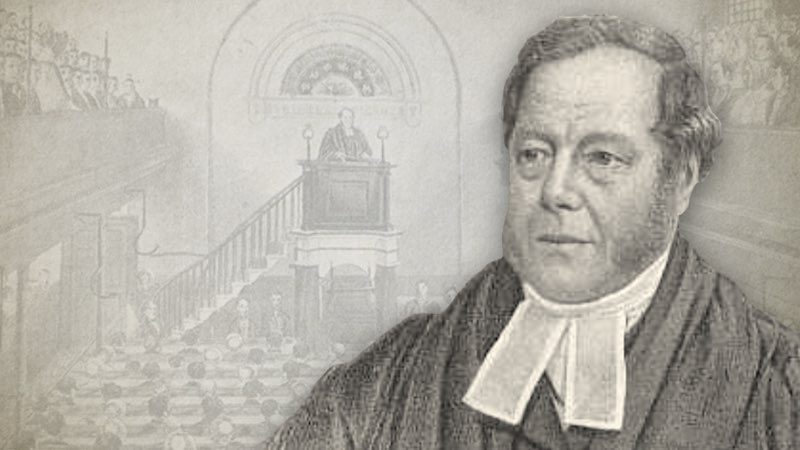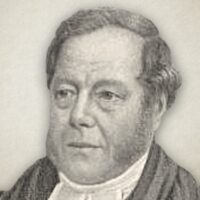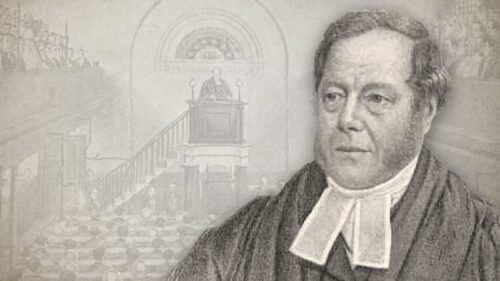
Second Edition
I feel encouraged to present this Second Edition to the household of faith, by the extensive circulation of the first, accompanied, as it has been in many instances, by the Divine blessing; and, among other testimonies in its favor, the following extract of a letter from Dr. Hawker, on his second reading of the volume, affords me peculiar pleasure, and with his kind permission I insert it.
“Your little volume on gospel doctrines, entitled Jazer, is now before me. I have read the first three letters on the Trinity, Divine Sovereignty and Election. And from the specimen there given on these glorious truths, I promise myself much satisfaction from the further perusal of the work.
Allow me in the mean time to say, that I am much pleased with the order which you have observed in the arrangement. You have very properly followed holy scripture on this ground, in beginning where God hath begun, and in bottoming the great truths of Revelation on the same foundation as the word of God hath done before you. The entrance both to the Old Testament and to the New, is with the doctrine of the Holy Trinity. We find the sacred “Three that bear record in heaven” in counsel at the creation of man, Gen 1:26, and we have the same glorious Persons in the Godhead at the redemption, Matt 3:16,17, making this, therefore, what God hath made it, the basis; the superstructure cannot but follow. The everlasting love of Father, Son and Holy Ghost to the Church in Christ, runs like the links of a chain in beautiful order from one eternity to another. And what can break down the arch founded in everlasting strength? What can counteract an everlasting covenant “ordered in all things and sure?” What can dry up “that river, (which hath been running from everlasting) whose streams make glad the city of God?
Allow me, yet further to remark, the very special and seasonable time as the present, for contending earnestly “for the faith once delivered unto the saints.” The mysteries of the Gospel are for the most part but little regarded. And even among many who profess to believe them, so much are they kept in the back ground, and so seldom brought forward to view, as if they were only secondary points in “the glorious Gospel of the blessed God.” It is worthy observation that the Lord himself speaks of this conduct by his servant the Prophet with great reprehension. “I have written to him (saith the Lord speaking of Ephraim) the great things of my law, but they were counted as a strange thing.” Hosea 8:12. And allow me to add, moreover, that I cannot but highly commend the zeal you express, at such a time as the present, to be instrumental in the Lord’s hand, to the promotion of the Lord’s glory in the hearts of the Lord’s people, especially to “the weak in faith,” and “babes in Christ,” and old as I am, and now hastening fast to the boundary of time, I feel the glow of affection arising in my wrinkled face, while sending forth the prayer on the isthmus of life, that God may do good unto Zion: and bless his people!
I beseech you to exercise an holy jealousy over your own heart that nothing may satisfy you on divine truths but that “unction from the Holy One” by which “we know all things.” The only standard of decision by which the spiritual Church of our Lord Jesus Christ, is known as well from the mere professor as from the prefane, is, when under the sweet influences of the Holy Ghost, the child of God hath a personal knowledge of, and personal communion with, the Father and with his Son Jesus Christ.
Your’s in the Lord,
Robert Hawker
Plymouth, Charles Vicarage,
October 19th, 1822″
Joseph Irons (1785-1852) was an Independent sovereign grace preacher, author and hymn writer. In 1819, he was appointed the minister of Grove Chapel, Camberwell, a position he held until his death thirty-three years later. John Hazelton wrote of him:
“Joseph Irons (1785-1852) was one of the ablest preachers of his day, and a powerful and prolific writer. His doctrinal teaching was pellucidly clear and consistent; he was a profound student and sound expositor of the Word of God, and many were influenced by his sermons, spoken and printed, and confirmed in the faith of God's elect. He was a determined foe of Romanism and Ritualism, deeply interested in the welfare of the young, and ready to aid any effort that commended itself to him on the basis of the faith for which he so earnestly contended. Many of his hymns have secured a permanent place in our hymnology, and his sermons are doctrinal, experimental, and practical in the best sense of the words. He never ceased to preach Christ, making Him the Alpha and Omega of all his discourses. He was born at Ware, in Hertfordshire, and brought up under the care and counsel of a godly father, who was a builder, and who trained his son in that trade. When he left his father's roof, he tells us the parting words were, "There's poor Joseph going to that wicked London. My heart bleeds while I bid him goodbye. I fear it will end in his ruin. You will be far away from a father's eye and a father's counsel, but never will I cease to pray for you that God may preserve and prosper you, although surrounded with so much that is evil." The youth was but eighteen when, in 1803, God led him to the Church of St. Mary Somerset, Thames Street, to hear W. Alphonsus Gunn, and there the arrow was directed into his conscience and he was brought to a saving knowledge of Divine truth. In 1808 his first sermon was preached over a smith's shop at Dulwich; he was actively engaged in business, but on most Sundays would walk from ten to twenty miles, preaching in various villages. "My only companions were my pocket Bible and its Divine Author, who often favoured me with the spirit of prayer on the way and shed many a ray of Divine light on the inspired page, so that I was furnished with a 'Thus saith the Lord.'"
After six years' service in Hertfordshire, he became pastor of the Church at Sawston, near Cambridge, and in January, 1818, he preached his first sermon in Camberwell. Ultimately, Grove Chapel was erected and opened on July 20th, 1819, and within its walls until the time of his death he continued proclaiming the Gospel; his mortal remains rest in a vault under the pulpit. In his last sermon, about ten days before his decease, he spoke of heaven in joyful terms: "I confess that my soul longs for it, and I anticipate meeting with prophets and apostles and patriarchs, and above all, with Jesus Himself, to behold Him face to face in glory, to be like Him, and to see Him as He is."
His published writings were numerous, some running into many editions. "Jazer," letters on Gospel doctrine; "Nathaniel," letters on Christian experience; "Nymphas," an exposition of the Song of Solomon; 611 original hymns; and a paraphrase of the Book of Psalms, are among the number. He established a Home Mission and other Societies for visiting and assisting the sick poor, and to the end of his life he was one of the best friends and helpers of the Aged Pilgrims' Friend Society. This great man was no idler in the Lord's vineyard. He talked not about "working for Christ," but delighted to magnify his glorious Lord. His sermons should be models for our preachers to-day in their perspicuity, plainness and power. He could not cut and trim to the times. His faithfulness gave offence to many whose creed and conduct could not bear the blaze of truth and the pointed appeals he made to conscience. Many hard speeches were made against him, but he remained unmoved as an iron pillar. As a man he had very tender feeling and often smarted under the unkind treatment of those of whom better things might have been hoped; but neither the fawning of one party nor the frowns of the other could shake his firmness. When at home in his "Shepherd's Tent," Grove Lane, he used very frequently to visit his chapel; to him it was a peaceful, private promenade, after the close confinement of his study, in which he spent many hours every day. Covenant love, covenant blood and covenant grace were his constant theme. His dying desire, so graciously fulfilled, was that Grove Chapel "might never be desecrated with another gospel." Someone told him that he put too much in his sermons and should reserve ideas for future use. He replied, "Thank God I obtain my materials from heaven; my Master knows what things I have need of, and having called me, He will not allow me to work alone. I get my sermons on my knees with the Word of God before my eyes and if I empty my seed-basket to-day, I know He will fill it to-morrow; therefore I will, God helping me, tell it all out, or it would be like a fire in my bones, burning its way out." Grove Chapel recalls many memories of those who have gone before; in its schoolroom is a unique collection of portraits of free grace ministers of various sections of the one Church. In No. 5 pew in the Chapel is the spot where the Lord first met with the "Wayside Notes" writer, broke him down in contrition of heart and revealed Christ to him as all his salvation, and there are friends still with us who can testify to the power of Mr. Irons' ministry, when in their early years they sat under it.”




